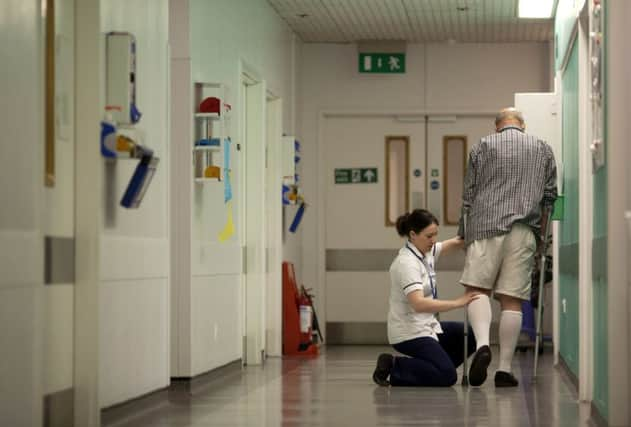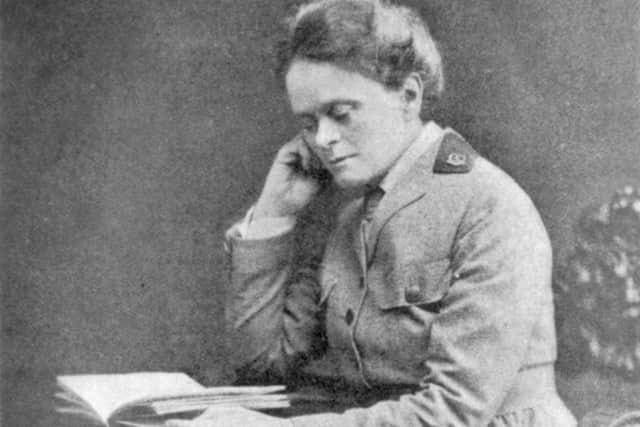Lori Anderson: Nursing our resources is key for NHS


Now I’m not one to play favourites, it’s not just a man in uniform that can turn my head. I like a bit of crisp regimentation, be it architecturally or sartorially. Uniforms seem to have paled a little in recent years, doctors have lost their white coats and headmasters their black gowns. Whilst watching The Knick, a hospital drama set in New York at the turn of the 20th century, I marvelled at the white frilled, cock’s comb style nurses hats which jutted skywards like wafers atop a peach melba.
At the time the drama was set nurses had only been receiving formal training for less than 40 years. Previously the sick had been cared for by nuns or females within their own family. Nursing in the mid 19th century was considered the remit of “slatternly widows, runaway wives, servants out of place, women bankrupt of fame or fortune” according to one Dr JB Russell, Glasgow medical superintendent of the Police Board hospital, who said: “I admit that at present nursing is the last resource of female adversity.”
Advertisement
Hide AdAdvertisement
Hide AdA great deal has changed in the last 150 years. Nurses received proper training, at first on the job at the hospital and later through medical degrees and diplomas. It is fitting that, in the 100th anniversary of the First World War, we remember the courageous work of Scottish nurses such as Elsie Inglis, who founded the Scottish Women’s Suffragette Federation, and organised the first medical teams to go to France, Serbia and Russia to tend to the wounded. She was the very epitome of a stern matron, capable of reducing nurses to tears with her temper but her diligence and demands brought a typhus epidemic under control and Winston Churchill said that the work of Inglis and her nurses “would shine in history”.


Whatever the changes that have taken place, the hospital ward remains a stage for drama. Earlier this week Scotland’s biggest nursing agency aired the NHS’s dirty laundry by warning that there were now not enough qualified nurses in Scotland to fill all the gaps in the weekly rotas for the nation’s wards. Ann Rushforth, chief executive of nursing agency ScotNursing, said that where previously they could fill 90 per cent of available shifts, this had now fallen to just 40 per cent.
The reason for the drop is that young people, particularly women, who have traditionally made up the majority of nursing staff, are no longer joining the profession in the same numbers that they previously did.
The once narrow corridor of careers open to women has now widened into a bustling boulevard and, as Ms Rushforth explained: “It takes four years to train a nurse. Sadly school leavers these days don’t seem to want to be nurses. They want to be veterinary nurses and supermodels.”
In order to tackle the gaps in the rota, Ms Rushforth is calling on those qualified nurses who previously worked in the NHS but went on to work in care homes or took a career break to raise a family, or perhaps embarked on a new profession, to consider updating their clinical skills to do the occasional shift work in what would clearly be a considerable service to the nation. As she said: “People can make a significant difference by doing just one shift a month. There are hundreds of vacancies we can’t fill but this work still has to be done by someone. People may not realise they’re not getting the support they should have.” She added: “Nurses are not like instant coffee. You can’t just make them. In particular, nurses willing to do occasional shifts have become as rare as pandas.”
The problem is that, while the number of nurses in Scotland is rising, it is not increasing fast enough to keep up with rising demand of the nation’s hospitals. Last year there were 58,000 nurses and midwives in Scotland’s NHS, up from 55,000 in 2005, but during this decade hospitals treated an extra 429,000 patients, with one extra nurse for each 143 attendees.
The Royal College of Nursing has repeatedly warned that health boards are under “tremendous pressure” to fill vacancies but that staff nurses are simply not available. Both Scottish Labour and the Scottish Conservatives made manifesto promises to increase the number of nurses in Scotland by an extra 1,000 while the Scottish Government has said that it has taken measures to support nurses and further increase numbers.
I hope so. A good nurse has the ability to radically alter a person’s life. When we visit someone we love in hospital, we often can’t help but bring our fear and anxiety to the ward along with our magazines and grapes. We worry about when or even if they will recover and what could lie ahead, but a competent, kind and caring nurse has the ability to fold up our fears and leave us instead with the comforting knowledge that our loved ones are in good hands.
Advertisement
Hide AdAdvertisement
Hide AdSadly, an encounter with even a good nurse having a bad day, one who is irritable, distracted or impatient, can fire one’s anxiety levels through the roof, though thankfully this is a rare exception rather than a depressing rule. The best nurses often have a sense of vocation to spend their days helping and healing, and those of us who have been under their care can only testify to the benefits. It is often the little things that count. The extra few minutes in conversation with an anxious elderly patient or playing with a bored child. Time which clock-watching bureaucrats could dismiss as frivolously wasted, but is greatly appreciated by the little boy in the bed.
The concern is that today’s nurses are coming under increasing pressure as gaps in the rota fail to be filled and eager young recruits prove hard to find. It is a problem that, if not tackled quickly, will leave us all feeling poorly.